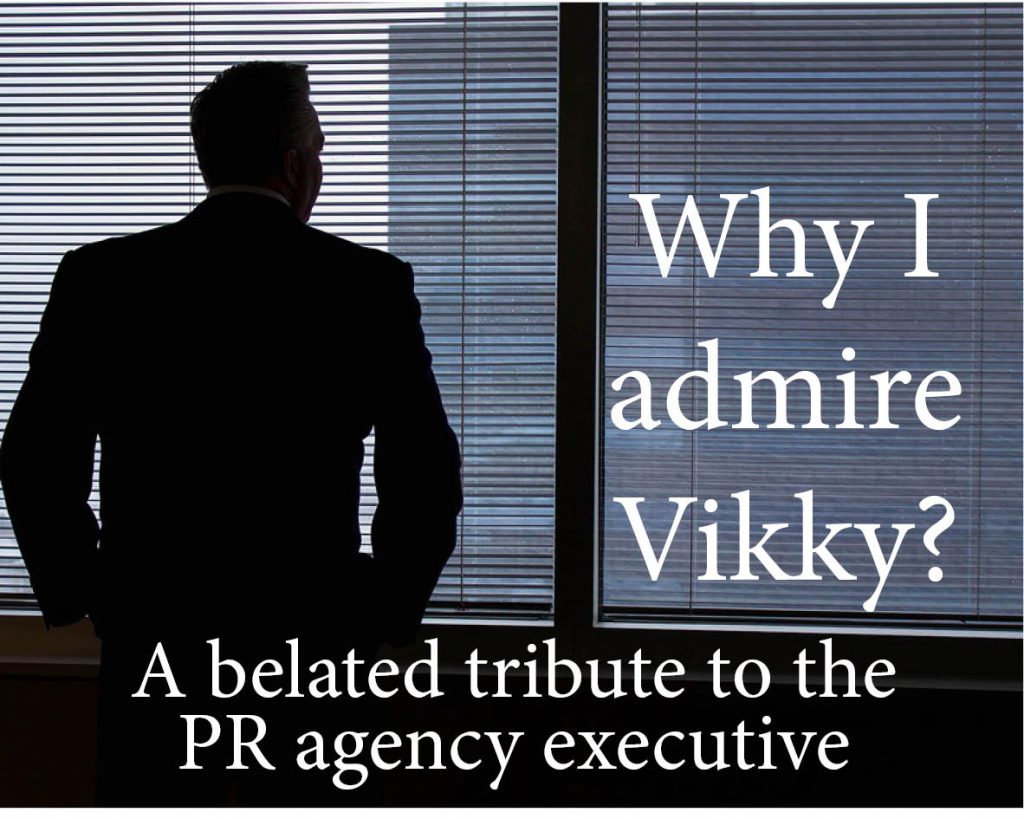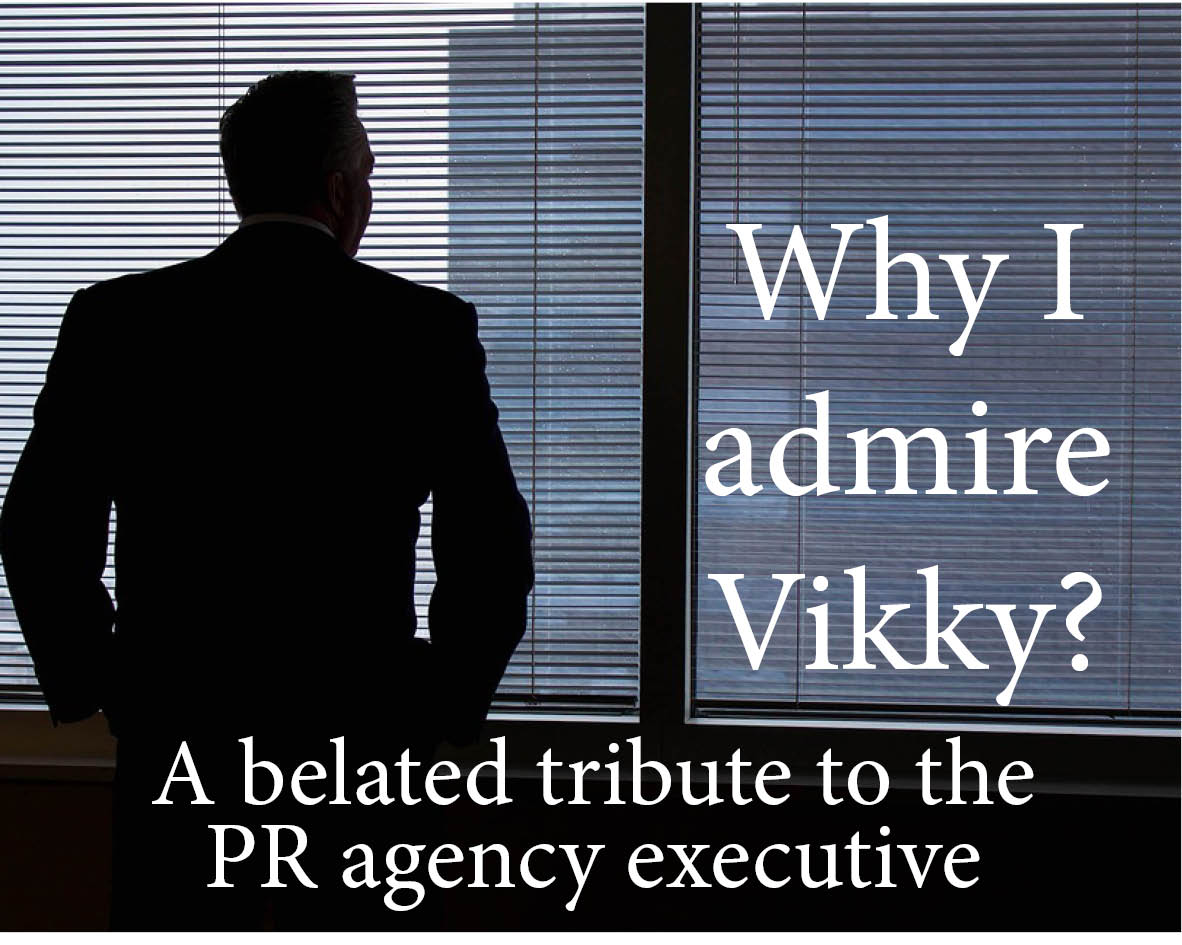( First appeared in Vidura Oct-Dec 2013)
Let me call him Vikki. The youngest son of a retired Delhi babu, Vikramaditya realises in his 3rd year BE, that Engineering is not his cup of tea and, calling himself Vikki, enters the exciting world of PR. Vikki is typical – and possibly the mean – of the PR executive population. ‘Vikki’ is apt because when stuck, people turn to him and he is supposed to know everything. ‘Vikki’ is apt, also because he is easily editable even without a murmur.
Having worked with a large number of PR agency executives in the last three decades and having seen many more in action and inaction, not to forget what numerous Corporate Communicators across cities have shared, I believe that Vikki and his colleagues have not received their due credit. Hence this tribute to Vikki, though admittedly, not without the inevitable errors of generalisation.
The proliferation of PR agencies in India is a post-1970s phenomenon. Until then Ad agencies used to handle ‘media relations’ – essentially restricted to sending out invites to press conferences and distributing press releases. Credit should be given to the PR agencies and the new crop of PR executives, for effecting huge leaps in reputation-management and practices in the country, and for teaching corporate India 360 degree communication. Increasingly, campaigns are run and product- launches are managed, primarily through PR, at a fraction of the advertising budget – a double whammy for the ad agencies who also had to surrender much of the traditional 15% commission by the turn of the century.
Surely, it has not been easy, teaching corporates the PR fundamentals and fundas. Or reminding them when they turn greedy — having tasted the initial low-lying fruit — that there are no free lunches. “Why no cover story?”, demands the CEO. Vikki won’t tell him the truth (namely, “you don’t own the publication, buddy. Moreover, how does it matter to readers that you have signed on to build a godown for the Russians?”). Instead, Vikki would say, “We had it all sealed up, Sir. But then, late evening, the border skirmish swept everything off the front page”. Vikki realises that border skirmishes have become his most frequent – yet relatively credible – excuse for press releases getting deleted without a trace, on journalists? computers.
Vikki knows that the annual contract review is only months away. A comprehensive business story can mean opportune remission for some recent spills and spells of inaction. Besides, the snaps of the CFO, and the heads of HR and R&D can easily be smuggled in. Magazines like to show off people’s photos. Magazines also have space to fill, so an interview each with the CEO and the Chairman can easily be managed. In fact, the interview with the Chairman will be managed, not with a debit, but with a credit, in the goodwill account – as if setting up the interview was a favour to the journo. Everybody will be khush, including Vikki’s own boss. Visualising his boss handing over his much-delayed promotion letter, Vikki himself starts feeling good. That’s when his phone rings. It’s Gourav, the CorpCom Manager, calling to say: ?Chairman doesn’t want your expected questions. He wants the actual questions the editor plans to ask at the interview.? Never say no, so Vikki says, ? OK boss, let me work on it?. Vikki knows what to do but he will keep it to himself : somehow delay the interview till the Chairman leaves on his summer holidays, then by email get his answers to the journo’s questions…
Why is it that Vikki has to always think on his feet, to stay alive?
The game that Vikki is playing is a bit of Russian roulette in the interplay between the client, the media and Vikki. Rules, if any, are arbitrary and one-sided. Vikki does not set those rules. They are set by the client and the media.
1. The contract is too vague on deliverables.
Not much after signing the contract, both sides realize that the agency recommendations that sounded good and clinched the contract, are mostly Utopian. Soon it becomes clear that reputation scores are a composite result of so many things. Abandoning the grand ideas of achieving an outcome target, both sides agree to agree on an input target, basically an activity listing. Midway through the year, both sides realize that to pull off the approved action plan, the client has to keep his end of the deal, which is not always possible. And even when the client delivers to the plan, the media is in no mood to oblige the agency meet its promise of coverage. Vikki is destined to score poorly – may not be always, but often.
Of course, there are exceptions, on both sides of the bell curve. An advertisement put out by a Govt Dept a few months back asked interested PR agencies to apply by committing deliverables in terms of minimum monthly /quarterly / annual coverage, in number of stories and the aggregate size of coverage! It read more like a tender notice for the supply of bricks, granite and sand. One is not privy to whether an agency was selected and when the blame game began about not delivering as per the bill of lading forming appendix II of the contract.
2. Vikki has no authority over what he promises to deliver.
It is the journo who has to deliver what Vikki promises. But the journo, at will, can be the seeker of truth or the trustee of public interest, speaking from a high moral ground. Once he reads or listens to Vikki’s ‘pitch and pronounces it as lacking substance, no force in Nature, nor any court of law, can revive that story . It is end of the story, unless Vikki can prime up another journal, leading up to pitching the story once again. Vikki has the handicap of a principled suitor, who can propose to a girl only after the first favourite says no. That takes time. The client is not pleased to find an action pending in so many consecutive weekly activity reports.
Unlike advertising, where the media woos the agency, in PR the roles are reversed. Unlike advertising, where the price for a square cm of print or a second of airtime is known, in PR, media space and time are discretionary. Simply put, journalistic justice is not justiciable – that is the irony of the fifth estate that seeks transparency in everything around it.
Business has a singular end objective: to maximise shareholder value. Everything else is subservient to it. Individual stakes on business success are high, including bonus packages and lucrative extensions. Such being the case, why would any sane business organisation co-operate, or even allow, for information to go around, especially when it is on work-in-progress or what is injurious to its brand and financial health? On the other side of the fence, business developments too premature for public knowledge and, equally, dollops of inconvenient truths, are caviar to the journo, pumped up by the first-with-the-news drive or drooling over byeline stories on page 1.
Buffeted between these two conflicting interests is Vikki.
3. It is an unequal relationship.
Client’s requirements set Vikki’s tasks. He is the spin doctor who also has to kill stories. It is for crisis management that he is most in demand. Things can go wrong in the client’s operations anywhere in India or outside, any time. Vikki is expected to cover all bases through all time zones, know if the media knows or not about the under?construction building collapse, if they are putting out the story or not. He is the one chosen to douche the fire – even Vikki’s boss is convinced that the client should not be seen anywhere near the problem. Strategic unavailability, you know.
Gaurav is happy to deal with the sweet one from the news channel, but when she asks some unexpected questions, the can passes to Vikki. Gaurav will do his best to see that the agency does not have the CEO’s ears, so Vikki better find a way, bartering past goodwill and future obligations.
Thus the show goes on. But let not the length of relationships between PR agencies and their clients be misread to reflect satisfaction. Status quo has its own comforts and conveniences – even fall guys have their uses. Even if some tapes were to tumble out, showing how the world actually runs without Vikki ? or his knowledge.
Vikki hasn’t heard a “Well done!” from Gourav in a long time, but of late, he keeps hearing in his mind what his Mom had said when he last visited home : “Beta, why don’t you come to Delhi, get married and join Dad’s new business”.
Disclaimer: If any reader finds real life parallels with any characters or situations from this piece, put them down to coincidences, or possibly their essential universality.

